Massive Protests Erupt At Korean Women’s Universities As Administrations Secretly Push For Co-education Transition
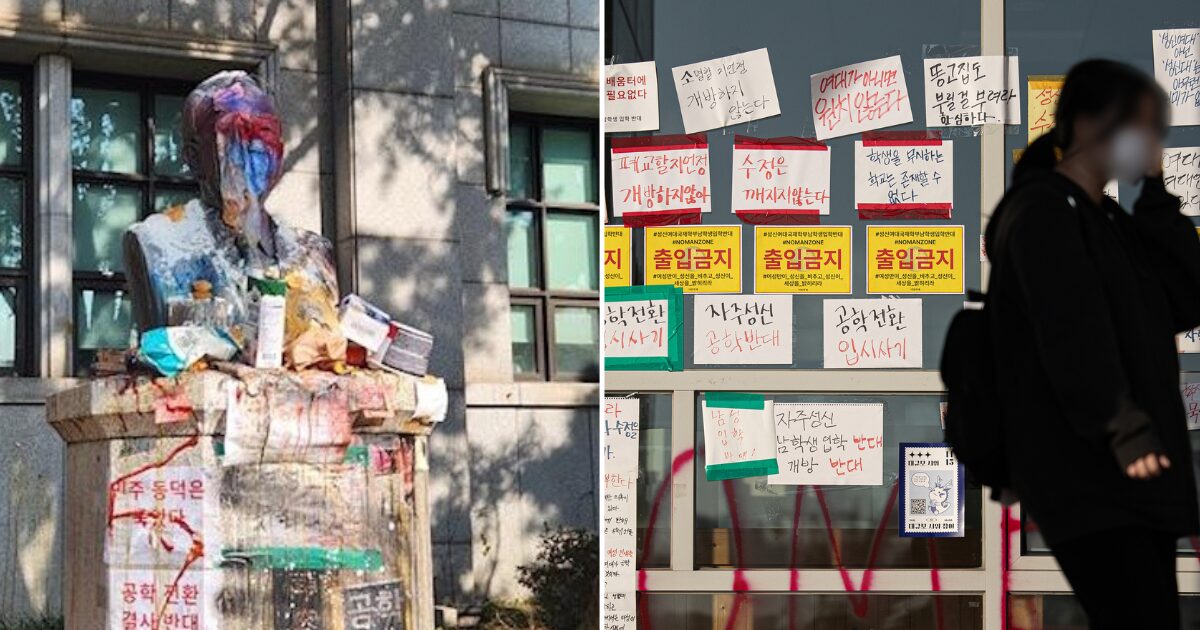
Content Warning
South Korea is home to multiple women’s universities that play a central role in women’s education and empowerment. Ewha University, Seoul Women’s University, Dongduk University, Inha University, Sungshin University, etc., are only a few of the women’s-only institutions that are highly revered in the country. But in the past few days, multiple of these campuses have witnessed intense student revolts.
Though students from different schools have joined the protests, Sungshin University and Dongduk University are the two epicenters. Both schools have allegedly pushed for a co-educational transition without consulting student bodies.
On November 11-12, the campus of Dongduk Women’s University erupted in major protests, with hundreds of students occupying buildings and boycotting classes. The historic campus was covered with funeral wreaths bearing slogans opposing the secret conversion of the university into a co-ed institution. Multiple structures inside the university were spray painted in red, declaring “No to Coeducation.” Students also pelted eggs and ketchup on the statue of the university’s founder, Cho Dong Sik.
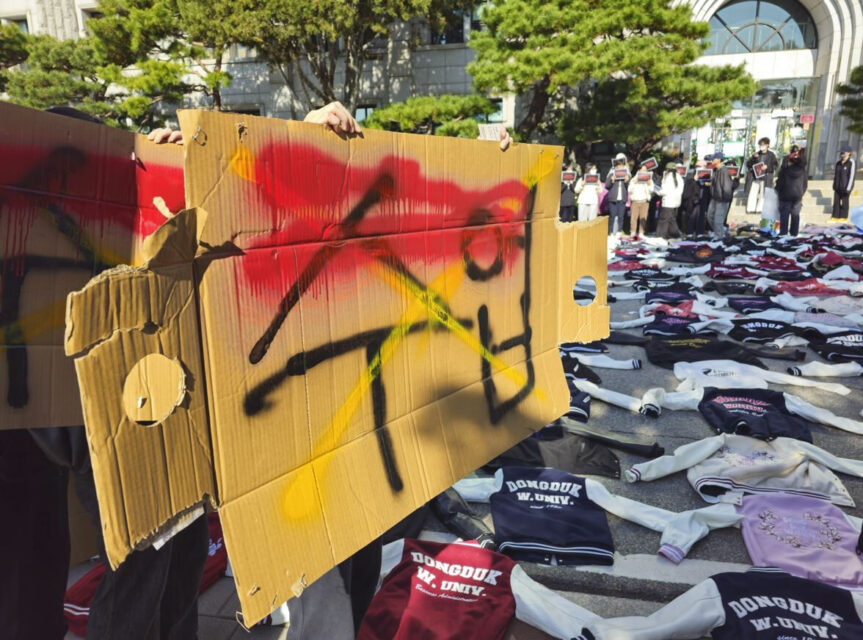
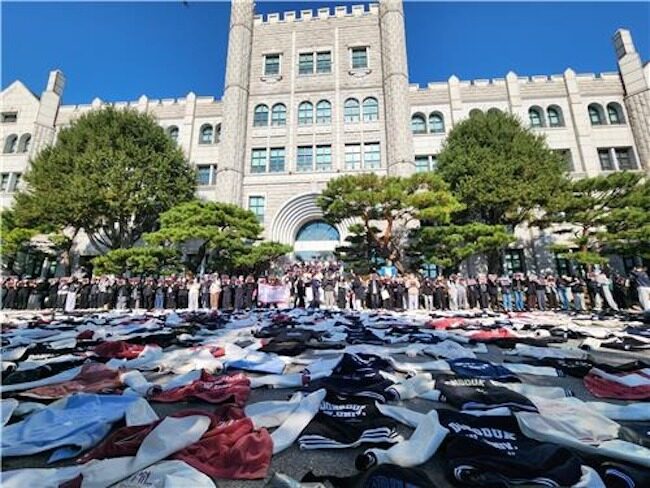
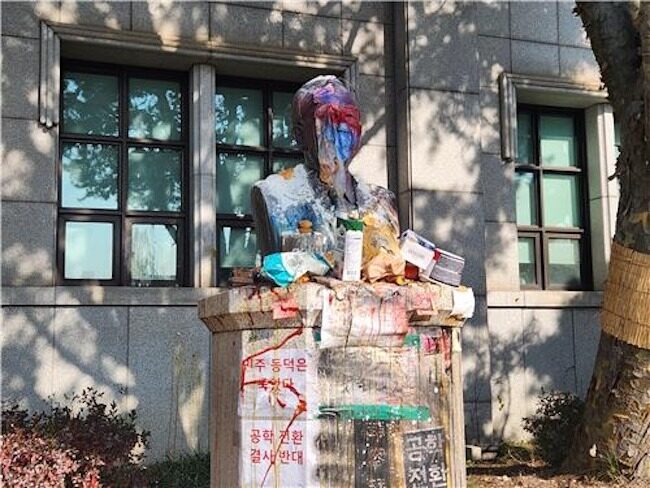
This chaos germinated from “Vision 2040,” a development proposal that the university has been discussing, allegedly in secret. As per reports, on November 7, students learned that the school was planning to admit male students under this proposal without consulting with the student body.
The university administration claimed that the change was only discussed as a possibility during a meeting to set goals for 2040, with nothing finalized. But according to official filings, the university has admitted six male students to the Korean Language & Culture Studies program this year. This is an undergraduate program that is meant only for international students.
According to Lee Song Yi, the co-chair of Dongduk’s emergency committee, several incidents of violence against women have added up to the student anger reflected in the recent protests. These include a man posting lewd photos of himself inside the campus in 2018, a professor sexually assaulting a student, a medical student murdering his girlfriend at the Sindang Station, the Busan roundhouse kick incident, and a man assaulting a woman for having short hair. In such a social climate, female students are staunchly opposed to the idea of compromising the few exclusive spaces for women.
Although the university isn’t a perfect haven, we have felt free inside the university campus, and getting rid of a safe space where women can freely express their opinions goes against the founding purposes of the university.
— Lee Song Yi
Students from other women’s colleges in Seoul also joined the protests at Dongduk. Multiple students donning the school jackets of Ewha University and Seoul Women’s University were spotted at the demonstrations.
Following the protests at Dongduk, Sungshin Women’s University also witnessed a huge protest on Friday, November 15. More than 1,200 students showed up at the demonstration to oppose the university’s decision to open admissions to male students in its International School of Korean Culture and Technology from the 2025 spring semester.
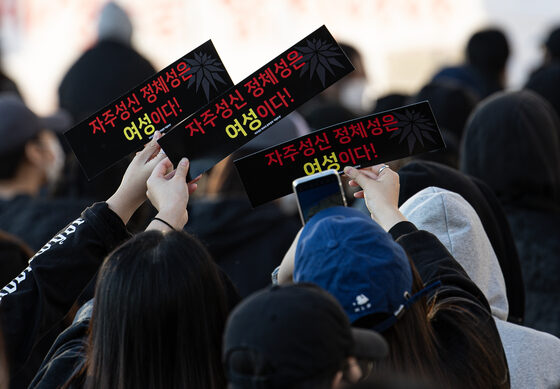
The Sungshin University campus walls have been covered with hand-written posters and signs condemning the school’s decision, and students have organized sit-ins as well. Funeral wreaths conveying messages opposing the admission of male students were also spotted on campus.
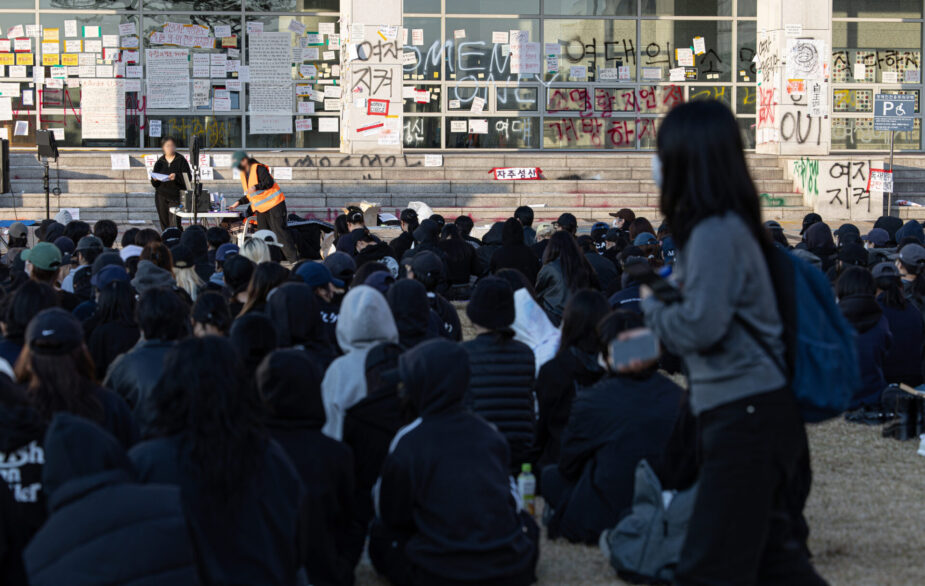
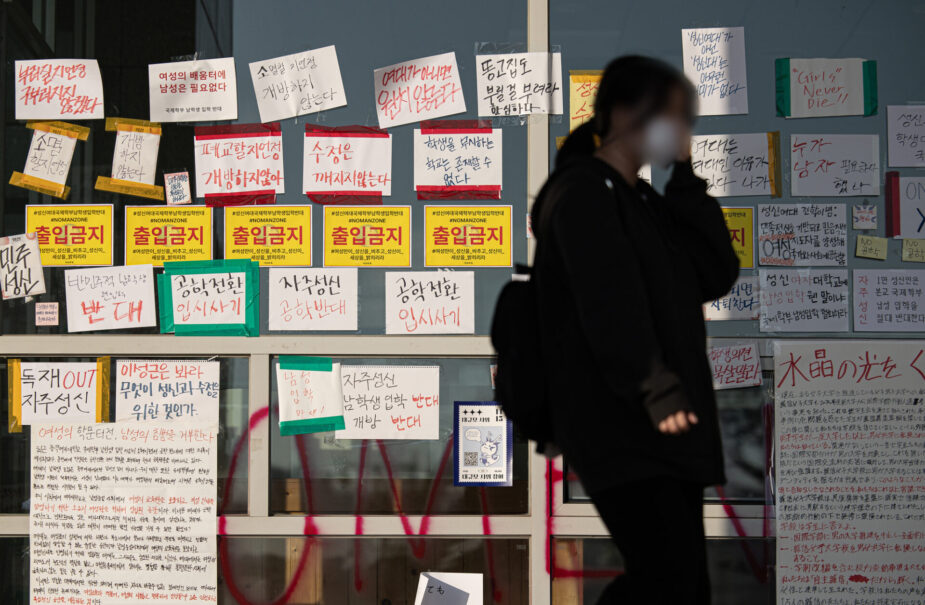
In both cases, the schools have been accused of responding to the student protests in an insensitive manner. Sungshin Women’s University allegedly used toxic thinners to erase protest messages from the campus structures.
At Sungshin Women’s University, students are protesting the school’s decision to admit male students without prior notice or consent.
The university is using highly volatile and toxic thinner to erase student messages, causing many to suffer from its effects. https://t.co/yu89enMDsx— Speak Misogyny🇰🇷 (@speekmsg) November 14, 2024
At Dongduk University, things escalated even further, with male professors allegedly acting violently toward protesting students on multiple occasions.
A male professor at Dongduk Women’s University is shouting at protesting students inside a building, demanding they open the door, and hitting a glass door with a brick. https://t.co/DOGDz3Fkz1
— Speak Misogyny🇰🇷 (@speekmsg) November 12, 2024
A male professor at Dongduk Women’s University is acting violently toward a student. https://t.co/Yv4eY7cYr2
— Speak Misogyny🇰🇷 (@speekmsg) November 12, 2024
Police were also reportedly dispatched at Dongduk University when students tried to force their way into the president’s office on November 11. A police officer was caught on video urging students to calm down and reminding them that they would be giving birth to babies in the future and shouldn’t engage in illegal acts. The students, enraged at the comment, shouted back that they would not, and the brawl continued. According to Seoul Jongnam Police Precinct, the police officer’s comment came after the students tried to break into the president’s office while pounding the door with a fire extinguisher.
Dongduk Women University students are still protesting against the plan to make the university co-ed system.
Police: you'll be a mother of your children, and what you're doing now is illegal
Student: You get pregnant then, omega bastard! https://t.co/7wXDxDEkpB
— niken⁷ (@hyyhwhalien) November 12, 2024
A male police officer in Korea told students at Dongduk Women's University to stop protesting, as they would be "mothers" in the future. This remark underscores precisely why women's universities are still needed in Korea. https://t.co/no1aUIuIl8
— 꿀바름 (@Barum912) November 12, 2024
Students at these universities are continuing their fight to have the decision of co-educational transition repealed, and it wouldn’t be unprecedented if they succeed. In 2015, Duksung Women’s University also brought forth a similar proposal, followed by Sungshin Women’s University in 2018. Both had to be withdrawn after fierce opposition from students.